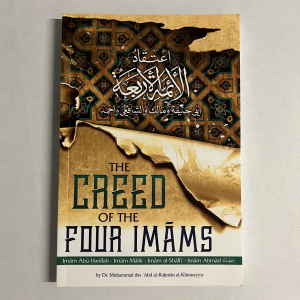- AL-HAFIZ IBN ABI AL-DUNYA
- AL-HAFIZ IBN RAJAB
- IBN QAYYIM AL-JAWZIYYAH
- IBN UTHAYMEEN
- IMAM ABU BAKR AL-AJURRI
- Imam al-Amir Muhammad ibn Isma`il al-Sana`ani
- Imam Al-Khatib al-Baghdadi
- Imam Al-Tirmidhi
- IMAM NAWAWI [D. 674 AH]
- Imam Ibn Abi Zayd al-Qayrawani (d. 389 AH)
- Imam Ibn Al-Jawzi
- IMAM IBN QUDAMAH AL-MAQDISI
- Imām Jalāl al-Dīn al-Suyūṭī
- Imām Muḥammad ibn ‘Abdu’l-Wahhāb
- Imam Muhammad Nasir al-Din al-Albani
- Shaikh ʿAbdu’l–Razzāq Ibn ʿAbdu’l-Muḥsin al-Badr
- Shaikh Ibn Baaz
- Shakyh Abdur-Rahman as-Sadi
- SHAYKH SALIH AL-FAWZAN
- SHAYKHUL-ISLĀM IBN TAYMIYYAH
- Yusuf Abdullah ibn Yusuf al-Wabil
Regarding The Celebration Of The Prophet’s Birthday – The Mawlid
€5.99 INCL. BTW
| Publisher |
|---|
-
 Voor 17.00 besteld, morgen in huis via PostNL
Voor 17.00 besteld, morgen in huis via PostNL
-
 Laagste Prijsgarantie: Zie je hetzelfde product elders goedkoper neem contact op en ontvang een 10% kortingsvoucher
Laagste Prijsgarantie: Zie je hetzelfde product elders goedkoper neem contact op en ontvang een 10% kortingsvoucher
-
 Gratis verzending vanaf 65 euro
Gratis verzending vanaf 65 euro
In stock
SKU:
9781641365284 @ 54.3
Categories: Books, English Books, Salafi Publications
Description
Loving And Respecting The Prophet (Peace be upon him) Between The Sincere Following Of The companions (May Allah Be pleased with them all) And The Hypocritical Innovation Of The Baatini Ismaili shiites of 4th -6th Century Egypt | Salafi Publications
Much debate regarding the subject of the Mawlid has taken place and continues to take place. The confusion regarding this subject returns back to the lack of clarity about what precisely is the nature of the innovation (bidʿah) that the legislation of Islam, the Shariʿah, has prohibited and warned against.
As for birthday celebrations, they have their origins and practice with the greatest disbelievers, polytheists and tyrants upon the Earth such as Pharoah and Ptolemy and are connected to magic, astrology and the casting of horoscopes. They were unknown to the Prophets of Bani Israʾil and unknown in the legislations which Allah revealed to them. Likewise, the early Christian Church, for the first three hundred years at least, never celebrated birthdays until the era of Constantine the Pagan Roman Emperor in the fourth century CE who merged what was already, by that time, a gross distortion of the clear message of Jesus (alayhis salaam) with Paganism, its symbols and customs.
It was the Ismaʾili Baṭini Shiʿite hypocrites and disbelievers who entered this practice among the Muslims three centuries after the era of the Companions of the Prophet (sallallaahu alayhi wasallam). This work provides a thorough historical and legislative treatment of this subject and addresses the foundational and subsidiary arguments used to justify this innovated practice.













